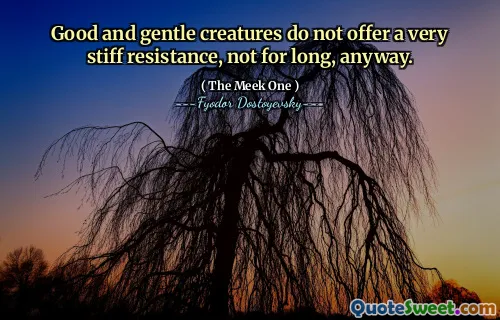
Good and gentle creatures do not offer a very stiff resistance, not for long, anyway.
This quote delves into the nature of kindness and strength, suggesting that gentle beings tend to yield rather than resist fiercely. At first glance, it might imply that kindness equates to passivity, but a deeper reflection reveals a nuanced understanding of resilience. In our lives, we often encounter situations where gentle perseverance outlasts forceful opposition. The notion that such creatures do not offer strong resistance for long can be interpreted as an acknowledgment that true strength lies in patience, understanding, and non-violent resistance. These qualities are frequently underestimated in a world that often celebrates assertiveness and aggression.
Drawing from Fyodor Dostoyevsky's exploration of human nature, the quote might be a reminder that humility and gentleness are not signs of weakness but rather forms of inner strength that can endure. The mention of "not for long" subtly indicates that resistance might be internal rather than external—sometimes, resistance manifests in steadfastness of spirit rather than outward rebellion.
In a broader context, this quote can serve as a lesson in compassion and endurance, encouraging us to approach conflicts with a gentle spirit, knowing that armed with patience and kindness, we may ultimately influence or bring about change more effectively than with forced resistance. It aligns with many philosophies that emphasize inner strength and moral resilience. Acting gently in the face of opposition can be a powerful testament to one's character and a catalyst for change that is rooted in understanding rather than confrontation.






